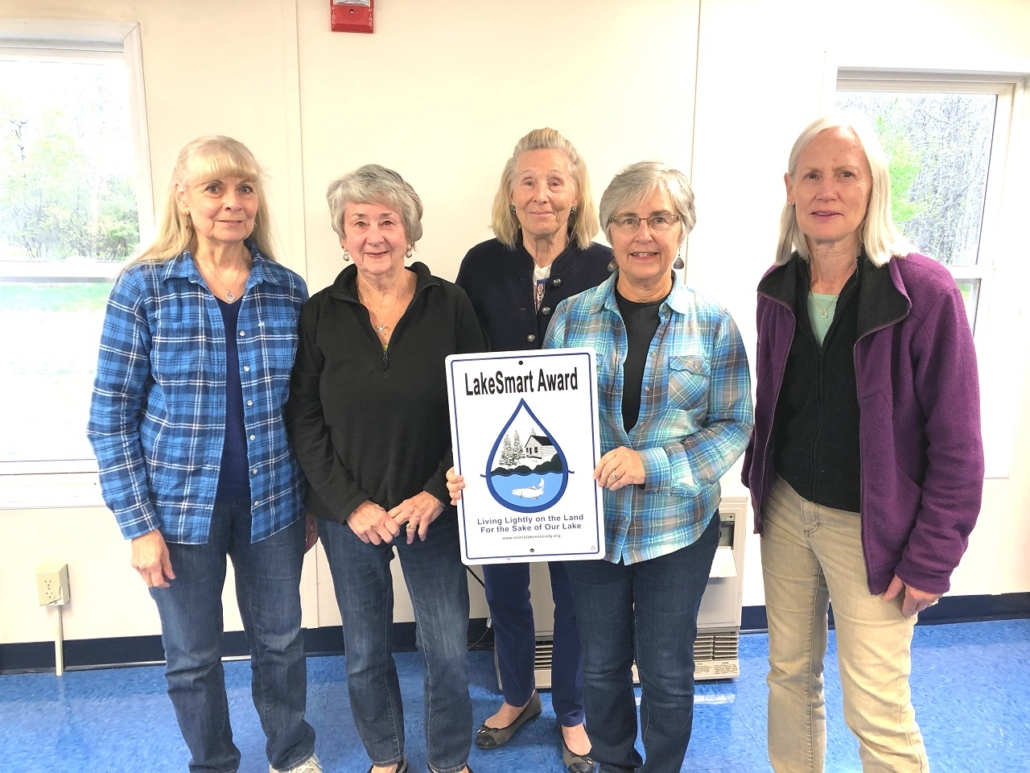
Firefighters participate in a “live burn” training exercise in Albion. (photo courtesy of Albion Fire & Rescue)
In the decades since, 1947 has become known as “the year Maine burned.” More than 200 fires raged across the state in the fall of that year, destroying over a thousand homes and seasonal cabins, burning a quarter of a million acres, and utterly devastating nine Maine towns. Thousands of Mainers went homeless. Sixteen people were killed. Maine’s governor, Horace Hildreth, called for a state of emergency. President Harry Truman mobilized the U.S. Army and Navy to help fight the fires and evacuate citizens.
Portents of the coming catastrophe came as early as March of that year. After a long and weary winter, the citizens of Maine were greeted by spring rains that, once they arrived, refused to let up until well into June. This was followed by one of the driest summers on record. Autumn arrived and still the rains held off. By October, all of Maine was a tinderbox just waiting for the spark.
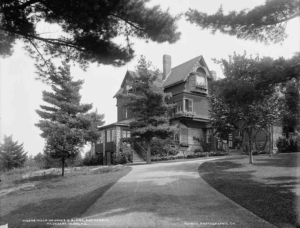
This “cottage,” owned by James G. Blaine, was one of those located along Millionaire’s Row in Bar Harbor, and destroyed in the 1947 fires. (photo courtesy Library of Congress)
Worst hit were York County and Mount Desert Island. The fires swept through Bar Harbor and obliterated the famous Millionaires’ Row, leveled half of Acadia National Park, and forced the evacuation of the island’s residents by sea.
Finally, on October 29, 1947, the rains came, and the fires across the state were at last brought under control. In the wreckage of gutted homes and flattened forests, the people of Maine began to think about how to prepare for the next fiery holocaust.
At the time of the ’47 fires, many of the smaller towns in Maine had no formally organized fire departments, and for those that did exist, there was no system in place for communication and cooperation in case of statewide fire emergencies. That all changed in 1947. Many of our local departments were established at this time, including South China and Albion, both in 1947, and two years later, Windsor, in 1949. China Village and Vassalboro boast a slightly earlier history, in 1942 and 1935 respectively.
This article about the current state of our local volunteer fire departments is based on interviews with seven area fire chiefs, from Albion, China, South China, Weeks Mills, Palermo, Vassalboro and Windsor. Research was also conducted using the internet, newspaper archives, and the exhaustively researched book by Joyce Butler, Wildfire Loose: The Week Maine Burned, available from the Albert Church Brown Memorial Library, in China Village.
Much has changed since the ’47 fires, and our local volunteer fire departments are facing some of the biggest challenges in their 70-plus year histories. With Climate Change bringing warmer weather, drier conditions and more extreme weather events, our volunteer fire departments are more important than ever before.

Tim Theriault, China Village Fire Chief
The number one issue on the minds of local fire chiefs is volunteer recruitment and retention. “It’s a national crisis,” says China Village Fire Chief Tim Theriault. “I’ve been on the fire commission for the State of Maine for five years, and this has been the number one topic. [Statewide], we had 12,000 volunteer firefighters a few years ago. We have 7,000 now. How do we fix this? There’s no silver bullet.”
The struggle to recruit and retain members of our local volunteer fire departments is part of a broader issue involving a lack of civic engagement affecting many organizations, including the Lions Club, the Masons and the American Legion. Volunteer groups like Fire and Rescue have been especially hard-hit by the drop in civic engagement, although it’s also apparent in other areas, such as the number of people running for local office.
“We had an opening [for selectman] last election, in March, and just one person ran,” Albion Fire and Rescue Chief Andy Clark says. “I think people are less likely to volunteer for their community than they used to.”
This decline in the enthusiasm of people to engage in their communities seems to be the result of a number of factors. One frequent complaint is that people are so busy today, often with both parents working just to make ends meet, and this leaves less time for involvement in community organizations.
The internet too has contributed to a drop in community engagement. People are finding their sense of community in online groups, which are usually based on common interests or ideologies, rather than common geography, and local organizations are suffering as a result.
Over the years, our communities have also shifted from rural towns, where people often worked near their homes, on farms or in local factories, to bedroom communities where people work quite a distance from their places of residence. This has had a significant impact on our volunteer fire departments’ ability to respond to daytime fires, especially during the week.
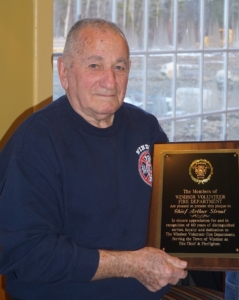
Windsor Fire Chief Arthur Strout, 79, receiving a recognition award for 60 years of service in April 2019. (photo by Eric Austin)
“Our daytime coverage isn’t getting any better,” says Albion’s chief, Andy Clark.
Windsor fire chief, Arthur Strout, relies heavily on several retired members of the department to deal with daytime fires. “There’s about four of us,” he says. “We call it the ‘senior group.’” Chief Strout, at 79, is one of them.
Training is another area that often serves as a barrier to those who might volunteer. Over the decades, training requirements have sharply increased, demanding a level of commitment that often surprises new recruits. Achieving Fireman 1 and 2 certifications can take upwards of 100 hours of classroom time, in addition to practical training involving live burns.
“The problem is,” says Vassalboro Deputy Chief Walker Thompson, “when you tell them they’ve got to go up to the fire school every other weekend, both Saturday and Sunday, [for four months], they might start it, but then they’ll drop out. They don’t realize how much bookwork is behind it.”
“The actual requirements from the Department of Labor haven’t really increased much over the last few years,” comments Albion’s Andy Clark, “but they’ve been more strict about making sure you do it.” However, he adds, “The training that you really need to obtain to do the job is increased, because there’s a lot more to it now.”
Many of our volunteer fire departments offer classroom training at the local station to make it easier for recruits to attend. “Every Monday night,” says Weeks Mills fire chief, Bill Van Wickler, who offers the training to new recruits from China and Palermo. “[We] started in October. We’ll finish sometime in June.” The study book they use is over a thousand pages and as thick as a brick. “All of what’s required is a lot of paperwork,” he says. “There’s just a lot to it to stay compliant. We all work hard at it. It’s time consuming.”
Like training, safety regulations have become more stringent over time. This can be a heavy burden for small departments staffed by volunteers, especially since state and federal agencies hold volunteer departments to the same standards as the bigger, fulltime fire departments. “That just strangles us out here,” says Palermo’s fire chief, Joshua Webb, who is also a fulltime firefighter for Gardiner.
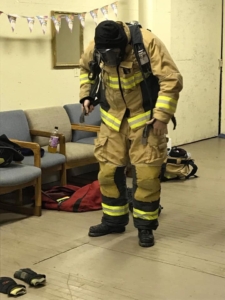
A firefighter in full fire gear. (photo courtesy of Vassalboro Volunteer Fire Department)
As safety requirements pile on, the cost of equipment also increases. “If it says ‘rescue’ on it, you can double the price,” Webb says. To outfit a new recruit, including coat, hat, pants, gloves and boots, it can set a department back more than $6,000.
“I remember when I first joined the department, we didn’t have any coats,” says Windsor’s chief, Arthur Strout. “The only thing we had was boots. We had to buy our boots, and back then they were fifty bucks.” Today, those boots cost $400.
Air masks, commonly referred to as SCBAs (self-contained breathing apparatus), are another bit of equipment – and expense – that departments didn’t have to worry about 50 years ago. They sell for about $1,500 apiece. It’s another expense, requires additional training, and are mandatory for any firefighter attempting to enter a structure on fire. Further, state law insists that at least four SCBA-certified firefighters must be available before anyone can head into a burning building: two to go into the blaze, while two others stand by as backup in case something goes wrong. For a small department, like Palermo with six active members but only two SCBA-certified firefighters, that’s a high bar. Luckily, strong mutual aid agreements between communities mean these gaps are often filled by firefighters from other departments who respond to the call.
“You can depend on it more than you could back 20 years ago,” says Windsor fire chief, Arthur Strout. “Twenty years ago you were more or less on your own.”
This spirit of cooperation, first sparked in the aftermath of the ’47 fires between the affected New England states and the federal government, has blossomed on the local level in recent years as a response to staffing challenges. “These towns would be hurting if we didn’t have mutual aid,” Strout says. “Other towns depend on us like we depend on them.”
It’s these agreements that have allowed departments to maintain the same reliable coverage even as they struggle to retain volunteers and the towns they serve continue to grow in population.
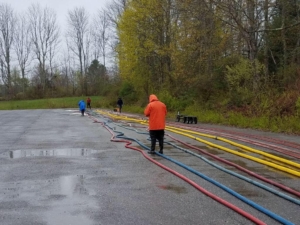
Windsor firefighters testing water hoses for leaks and weak spots, as required by state regulations for safety. (photo courtesy of Windsor Volunteer Fire Department.)
Perhaps the biggest – but least obvious – danger to local departments is volunteer morale. Firefighting is a major commitment. Not only are firefighters risking life and limb to keep their communities safe, they are also sacrificing time with family and friends to spend many boring hours training in order to stay compliant with increasingly stringent state and federal regulations. It’s a lot to ask from anybody, but even more so from unpaid volunteers.
Disagreements between departments and the municipalities in which they operate can be disastrous. Earlier this year, such a disagreement in the town of Thorndike led to the resignation of 28 members of the department.
As Dick Morse, fire chief for South China, says, leading an organization of volunteers is different than being the manager of paid employees. People don’t volunteer to be firefighters for the money. They do it because they want to be part of something bigger than themselves. Destroy that fragile foundation, and the whole structure collapses.
“The only way you’re going to get people to continue to volunteer,” says Weeks Mills Chief Bill Van Wickler, “is if they feel good about it – if it makes them feel good – for their contribution.”
Fortunately, in most cases, fire departments enjoy warm support from their municipal governments, although that relationship is unique for each town. While Albion and Palermo maintain a separate firemen’s association, they think of themselves as essentially a part of their municipalities. Other departments, however, remain fiercely independent.
In recent years, to encourage participation and attract new recruits, most departments have instituted a policy of paying volunteers stipends. Palermo is the lone exception to this, although Chief Webb says a stipend policy has been approved by the town select board and will be implemented soon.
Stipends tend to run in the range of $10-$15 per call for rank and file volunteers, with some departments paying a per hour amount specifically for structure fires. “You’re [basically] paying for gas,” says Dennis Strout, a member of the Windsor fire department.
Officers and chiefs receive more, on account of the administrative overhead they have to deal with, but that hardly covers the amount of work the job requires. Bill Van Wickler, in his second year as chief for the Weeks Mills fire department, admits, “There’s an awful lot more to this than I realized when I thought it would be a good thing to do. I’m not saying I wouldn’t have done it; I’m just saying it was an eye-opener. I had no idea how much work being the chief would be.”
The challenge to find new recruits for local volunteer fire departments is also being addressed on the state level. A measure, the Length of Service Award Program (LOSAP), which would set up a pension fund for Maine’s volunteer firefighters, was passed by the Maine legislature and signed into law by Gov. Paul LePage several years ago, but has since failed to be appropriated any funding. A new bill to fund the program, called “An Act to Attract and Retain Firefighters,” co-sponsored by State Representative and China Village Fire Chief Tim Theriault, was recently passed unanimously out of committee. Although it was set to be voted on by the full legislature during budget negotiations in June, it has now been delayed until next year. Despite these setbacks, Theriault remains optimistic the measure will be funded in the next legislative session.
The fires firefighters are fighting have changed as well, becoming more dangerous to the men and women on the frontlines. Fifty years ago, homes were made primarily of natural materials: wood, steel, and organic products like horse hair for stuffing and insulation. Today, those materials have been replaced with vinyl siding, petroleum-based foam or plastic, and fiberglass. “They burn faster and give off more toxic fumes,” says Vassalboro Fire Chief Eric Rowe. Ironically, the fire retardant used on many products produces deadly smoke when it does burn, making air masks a necessity for anyone venturing into a burning building. “You get it on your coat and your gear,” Rowe says. “That’s how firefighters get cancer.”
“Building construction is a lot more dangerous today,” confirms Albion fire chief, Andy Clark. “You have hazardous materials, you know, and meth labs. There’s just a lot more [to worry about] than there ever was when I started [in 1993].”
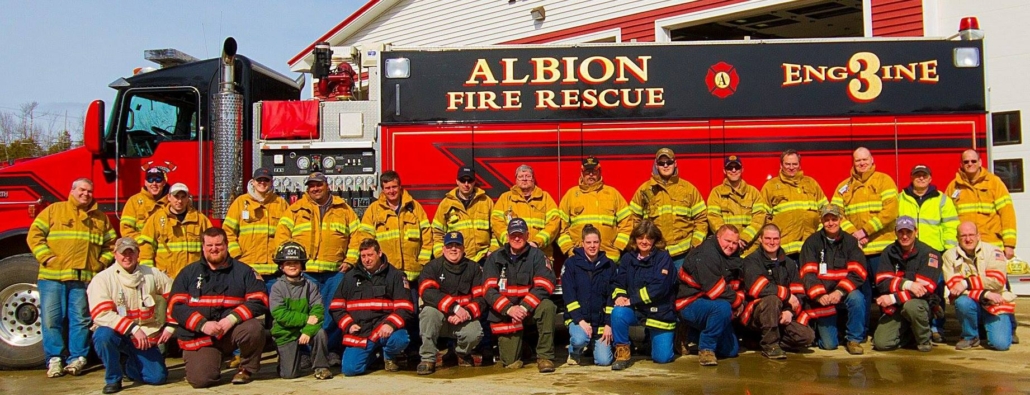
Members of Albion Volunteer Fire & Rescue. (photo courtesy of Albion Fire & Rescue)
Further, the toxic, dangerous nature of today’s house fires requires departments to maintain two sets of gear for each firefighter. One set needs to be ready to go while the other is being cleaned of poisonous chemicals. This requirement doubles the cost of outfitting new recruits, and because most of this gear needs to be custom-fitted for each volunteer, if a recruit quits, there’s no guarantee the gear you just purchased will fit the next one.
Yet, despite all these challenges facing our volunteer fire departments, the news is not all bad. This past year, China, Windsor, and Albion departments have all seen the highest number of new recruits in years, and Palermo is rebuilding its department after half a decade of decline. Fundraising efforts are up for almost everyone, and inter-town departmental ties are stronger than at any time in the past.
But what’s most important to local volunteer fire departments is having the support of the communities they protect, and recognition for the vital role they serve.
“On the worst day of the year, [when] there’s a storm, and everybody’s hunkered down in their homes, and a house catches on fire, or the wires go down, trees go down across the roads – they call me. They call my guys,” says China Village Fire Chief Tim Theriault. “If it’s ten below zero, we’re gonna be there, fighting that fire.”
Eric W. Austin writes about technology and community issues. He can be reached by email at ericwaustin@gmail.com.











 The Maine Department of Environmental Protection recently announced the second round of grant award recipients for recycling and organics management projects. These projects are targeted to divert waste from disposal by expanding composting and recycling opportunities across Maine. DEP received 14 proposals requesting $347,486 and will award $212,790 to fund 13 of these projects. Maine DEP is providing these grants to help businesses, institutions and municipalities address solid waste management challenges.
The Maine Department of Environmental Protection recently announced the second round of grant award recipients for recycling and organics management projects. These projects are targeted to divert waste from disposal by expanding composting and recycling opportunities across Maine. DEP received 14 proposals requesting $347,486 and will award $212,790 to fund 13 of these projects. Maine DEP is providing these grants to help businesses, institutions and municipalities address solid waste management challenges. Local educator and Maine Master Naturalist, Anita Smith, will be offering several day camps and family forest activities at the China School Forest. All programs start at the China Primary School bus circle, 763 Lakeview Drive, China. Limited scholarships are available, upon request. For more information or registration form, contact Anita Smith at 968-2255 or
Local educator and Maine Master Naturalist, Anita Smith, will be offering several day camps and family forest activities at the China School Forest. All programs start at the China Primary School bus circle, 763 Lakeview Drive, China. Limited scholarships are available, upon request. For more information or registration form, contact Anita Smith at 968-2255 or 





